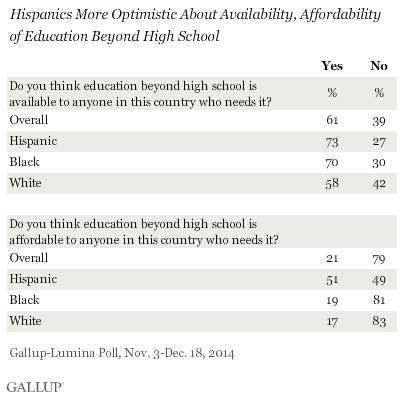Most Americans Say Higher Education Not Affordable
Brandon Busteed , Stephanie Kafka
Monday, April 27th, 2015
A majority of U.S. adults, 61%, believe education beyond high school is available to anyone in America who needs it -- down from 67% who felt this way in 2013. However, only a small minority (21%) believe higher education is affordable.

These findings are among many releasing Thursday in a report based on the most recent Gallup-Lumina Foundation Poll conducted Nov. 3-Dec. 18, 2014.
While the majority of all Americans believe higher education is available to anyone in the U.S. who needs it, some are more likely to feel this way than others do. For instance, Hispanics are more optimistic (73%) than whites (58%) that this type of education is available to all.
Although a majority of all Americans view these educational opportunities as available, few believe it is affordable to those who need it. More than three-quarters (79%) of American adults do not think that education beyond high school is affordable for everyone in the U.S. who needs it, while more than one in five (21%) think it is.
Hispanics are more optimistic in this regard. Fifty-one percent of Hispanics say higher education is affordable, more than twice as high as the 17% of whites and 19% of blacks who say the same. The greater optimism among Hispanics may reflect their increase as a portion of the student body in postsecondary institutions. In fact, the U.S. Department of Education projects that the percentage of Hispanics enrolled in postsecondary programs will increase by 46% between 2009 and 2020.
Implications
If a bachelor's degree is one important way for today's young adults to achieve the American dream, affordability in particular could jeopardize that dream. The average tuition bill for students at a public four-year college has increased by more than 250% over the past three decades -- and rising costs are likely a big reason why higher education seems out of reach for many in the U.S. A recent Gallup-Purdue Index study found that 35% of 2000-2014 U.S. college graduates report graduating with more than $25,000 in undergraduate student loan debt, in inflation-adjusted dollars. And while more than half of all adults in the U.S. believe higher education is generally available to those who need it, it is clear that affordability concerns could be placing higher education opportunities at risk for at least some.
The high costs associated with completing a degree beyond high school are also catching U.S. leaders' attention. In January 2015, President Barack Obama announced an initiative that would provide free tuition to students going to community colleges who attend at least part time and maintain a GPA of 2.5 or higher. The proposal is another indication that U.S. leaders share the public's concerns over rising costs in higher education.


